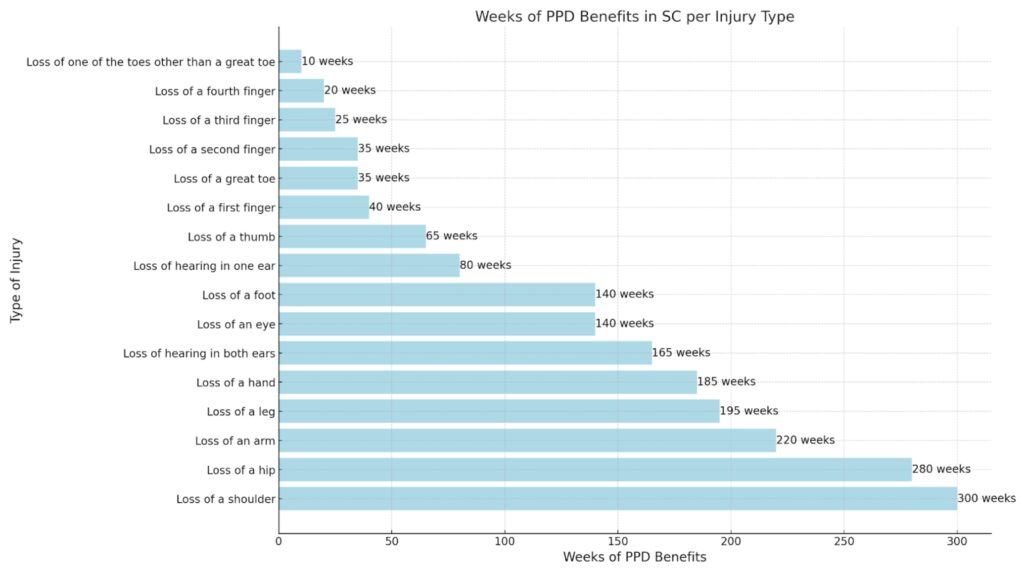Learn about your rights to PPD benefits in SC for work-related injuries, illnesses, and diseases
Understanding permanent partial disability (PPD) benefits is crucial for anyone who’s suffered a serious work-related injury, illness, or disease in South Carolina. PPD benefits provide essential financial support and medical care coverage to those who have sustained injuries resulting in a lasting, but not total, impairment.
Navigating the workers’ compensation system and understanding your rights to these benefits can significantly impact your recovery and financial well-being after a work-related injury. By being informed about your entitlements and the process for securing PPD benefits, you can ensure that you receive the appropriate compensation to aid in your recovery and help you adapt to any long-term changes in your working capacity.
What is permanent partial disability in SC?
Permanent partial disability (PPD) in South Carolina workers’ compensation refers to a condition where an employee sustains a permanent work-related injury, illness, or disease that partially impairs their ability to work but does not completely disable them.
This type of disability means the worker can still perform some work-related activities, though not necessarily at the same capacity as before their injury or condition.
What is the impairment rating in SC?
In South Carolina, the impairment rating, sometimes referred to as the permanent impairment rating, is a percentage assigned by a medical professional that quantifies the level of an individual’s permanent physical or functional loss resulting from a work-related injury or illness.
In other words, it’s a percentage a doctor gives to show how much a work-related injury, illness, or disease has permanently affected someone’s ability to move or function.
This rating is determined after the injured worker has reached maximum medical improvement (MMI), meaning their condition is stable and unlikely to improve significantly with further medical treatment.
The impairment rating in South Carolina is typically based on the American Medical Association’s Guides to the Evaluation of Permanent Impairment. The assigned percentage reflects the extent of the worker’s permanent reduction in physical capabilities.
This rating is crucial for calculating the worker’s eligibility for permanent partial disability (PPD) benefits and permanent total disability (PTD) benefits under the state’s workers’ compensation system. The specific value of the impairment rating directly influences the amount and duration of the workers’ compensation benefits the injured worker is entitled to receive.
Can I Get Workers’ Comp for Pain and Suffering in South Carolina?
Learn what types of damages may be available in your workers’ comp case.
What is the highest permanent partial disability rating?
Generally, PPD ratings are expressed as a percentage, with 100% being the highest possible rating for a specific body part or function under most systems.
A 100% PPD rating for a particular body part signifies total loss or total loss of use of that part, equivalent to a complete disability of that part, but not necessarily the entire person.
How much compensation can I get for PPD in South Carolina?
In South Carolina, the compensation for permanent partial disability (PPD) depends on the body part that is impaired and the degree of impairment, as determined by the impairment rating assigned by your authorized treating physician.
Compensation is calculated based on a formula that considers your average weekly wage prior to the injury, the specific body part impaired, and the percentage of impairment (your impairment rating).
Here’s how it generally works:
- Average weekly wage. Compensation is typically two-thirds of your average weekly wage, subject to maximum and minimum limits set by the state’s workers’ compensation commission.
- Impairment rating. This percentage reflects the extent of your permanent disability.
- Scheduled losses. South Carolina law provides a schedule under Section 42-9-10 that assigns a specific number of weeks of compensation for the total loss or loss of use of certain body parts, as shown in the chart below. For example, the loss of an arm may be worth up to 220 weeks of compensation, while the loss of a thumb may be worth up to 65 weeks.
- Formula. The actual compensation for PPD is generally the impairment rating percentage times the number of weeks assigned for that body part’s total loss in the state’s schedule, times the compensation rate (two-thirds of your average weekly wage).
For example, if you have a 50% impairment rating for the loss of an arm (which is scheduled for 220 weeks), and your compensation rate (two-thirds of your average weekly wage) is $400 per week, your PPD benefit would be calculated as follows:
50% (impairment rating) of 220 weeks = 110 weeks.
Then, 110 weeks x $400 = $44,000 in total compensation.

Additionally, for non-scheduled injuries, which are injuries that do not specifically affect the parts of the body listed in a state’s predetermined schedule of benefits (such as the back, neck, or internal organs), the calculation may involve the worker’s ability to earn wages after the injury compared to before.
Because workers’ compensation laws can be complex, it’s advisable to consult with a workers’ compensation attorney for specific guidance related to your case to ensure you get the full compensation you’re entitled to.
Do I need an attorney to help with my workers’ comp claim for PPD benefits?
In many cases, yes. Hiring a workers’ compensation attorney to assist with your permanent partial disability (PPD) benefits claim can be highly beneficial for several reasons:
- Expertise and guidance. Workers’ compensation laws can be complex. An attorney with expertise in these laws can provide valuable guidance, helping you navigate the claim process more effectively and understand your rights.
- Maximizing your benefits. An experienced attorney can ensure that all medical evidence is properly presented and that your injury is accurately assessed, which can significantly impact the amount of benefits you receive.
- Dealing with disputes. If your claim is denied, or if there are disputes regarding your injury’s severity or your benefits’ amount, an attorney can represent you in hearings or appeals, presenting your case effectively.
- Handling paperwork and deadlines. Filing a workers’ compensation claim involves a lot of paperwork and strict deadlines. An attorney can ensure that all necessary documentation is completed accurately and submitted on time.
- Reducing stress. Dealing with a PPD claim while recovering from an injury can be overwhelming. Having an attorney handle the legal aspects of your claim can reduce stress and allow you to focus on your recovery.
- No upfront costs. Most workers’ compensation attorneys work on a contingency basis, meaning they only get paid if you receive compensation, which enables you to pursue your claim without worrying about upfront legal fees.
Overall, hiring a workers’ compensation attorney can enhance your chances of receiving a fair and adequate settlement, ensuring that you’re properly compensated for your injury.
Maximize your PPD benefits with the help of an experienced Columbia workers’ compensation attorney
Navigating the complexities of a permanent partial disability can be challenging for injured workers. With the experienced team at Chappell, Chappell & Newman by your side, you can confidently pursue the full compensation you deserve.
Our knowledgeable Columbia work injury attorneys are dedicated to advocating for your rights and ensuring that your claim is handled with the expertise and attention it requires.
Don’t let the intricacies of workers’ compensation laws deter you from securing the benefits you need for a secure future. Schedule a free consultation with Chappell, Chappell & Newman today to maximize your PPD benefits and take the first step toward a successful resolution of your claim.
References
AMA Guides® to the Evaluation of Permanent Impairment: an overview. (n.d.). American Medical Association. https://www.ama-assn.org/delivering-care/ama-guides/ama-guides-evaluation-permanent-impairment-overview
Code of Laws – Title 42 – Chapter 9 – Compensation And Payment. (n.d.). www.scstatehouse.gov. Retrieved March 7, 2024, from https://www.scstatehouse.gov/code/t42c009.php

